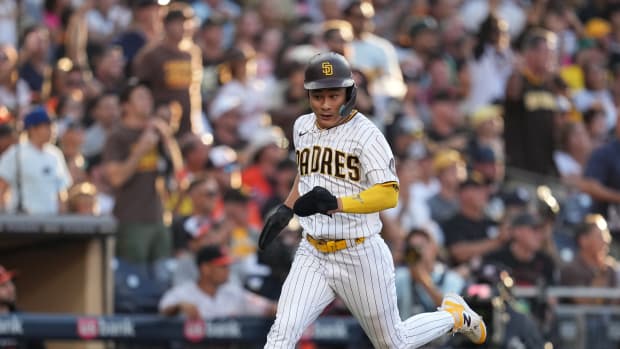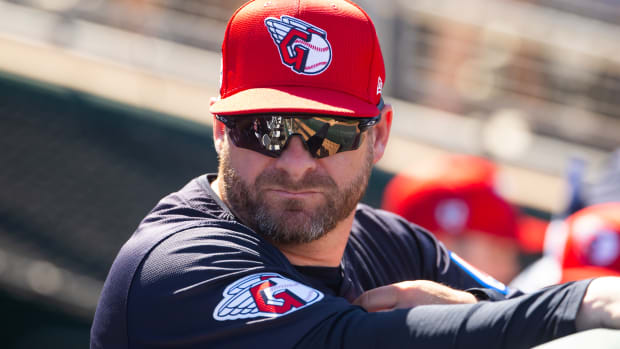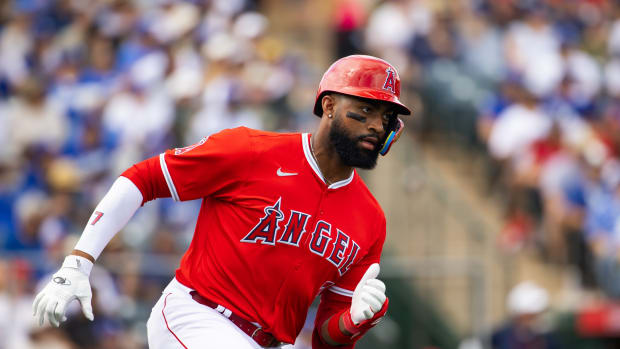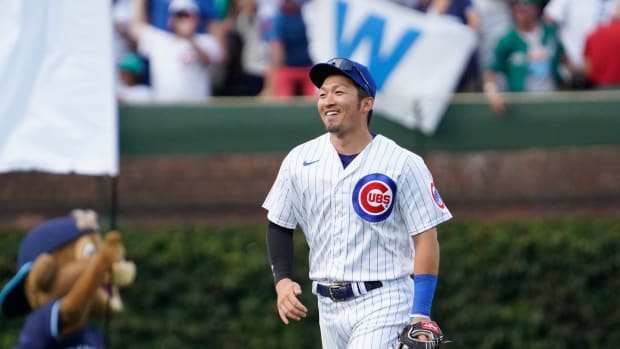Mike Trout's Record Contract With the Angels Is About Loyalty to the Only Team He Knows
If it can be said that handing one ballplayer $430 million is a bargain—what it cost recently to buy an entire hotel chain (Kimpton) or a clothing company (Perry Ellis)—the Los Angeles Angels got one in buying the next 12 seasons of Mike Trout.
Trout is the best player in baseball by miles. He produces WAR, the coin of the front office realm these days, at the rate of Manny Machado and Bryce Harper combined. And yet he sold his prime free agent years for an average annual value ($35.8 million) that is only 4% greater than what the Arizona Diamonbacks gave Zack Greinke three years ago.
Trout will play for the only team he has known until he is 40 years old after the Angels added 10 years at $36 million per year to the two years left on his current deal. He has $430 million guaranteed coming on top of the $78 million he’s already earned— which vaults him past Alex Rodriguez ($441 million) as baseball’s career earnings champion and its first half-a-billion-dollar man ($508 million). That’s all good news for Trout, the Angels and baseball fans, because one-team iconic players are an important part of the game’s history.
But this extension also is a statement about the decline of free agency and how owners have regained leverage over players. Trout should have broken the $40 million a year barrier. “Very underwhelming,” one agent called the Trout extension. “It had nothing to do with his WAR value … He should be well over 40 per year. He is the king of WAR.”
That Trout took less and did so two full years from free agency dovetails with the many stars before him just in the past three years that sold their free agent rights rather than exercising them (Stephen Strasburg, Giancarlo Stanton, Clayton Kershaw, Jose Altuve, Nolan Arenado, Aaron Nola, Luis Severino, et al). Owners have keenly slow-played free agency and weaponized WAR enough—while, let’s face it, tempting players with supersized sums—to convince players not to push the envelope.
“They are taking all the guys out of the system,” said another agent. “This has been their plan for years and well-executed.”
The only imminent test case up next is Boston outfielder Mookie Betts, who can become a free agent after the 2020 season. Betts has resisted an extension and is said to be the rare player who may want to be the flag bearer for the elite market.
“If he turned down 10/300 he might have just bought himself two more years or gets to demand Arenado AAV,” the agent said, referring to Arenado’s $32.5 million average annual value.
The other element in play is that the numbers at the top of the market have grown extreme enough that the risk-reward calculus of “pushing the envelope” isn’t what it used to be. When Rodriguez reached free agency in 2000 his original team, Seattle, offered him “only” $92 million over five years. The Rangers gave him $252 million over 10 years.
The Angels put another $360 million in Trout’s hands. That’s a long way from $92 million. Would you risk $360 million to earn more, get your true WAR value and earn an AAV that begins with a four? Do you want to be the guy to carry the union forward, pulling up the others behind you, the way it was in the 1990s? Those days, that kind of militancy, are gone.
The contracts of Greinke, Albert Pujols and Robinson Canó, when free agency was the pot of gold at the end of the rainbow, seem like ages ago. It’s only been a few years.
“I’m not sure how many more of those are coming unless guys are willing to take the last dollar and possibly switch teams to do so,” one of the agents said.
Trout wasn’t the kind of guy to push the system, anyway, just as neither were Tony Gwynn, Cal Ripken, Derek Jeter or Ken Griffey Jr., who never saw free agency in their primes. Trout has been treated well by the Angels and it is the only team he ever has known. It was the one team that took a chance on a high school outfielder from Millville, N.J. when 22 other teams passed on him in the draft. Trout has never forgotten that.
Trout also is a happy soul. There is nobody in the game who represents the game better than Trout. He signs autographs for kids every day and plays hard and well and with a smile on is face. Greatness rarely looks this good.
He is so good that his best comps are dead. Trout has the highest WAR through his age-26 season (64.3) than any player in history, just ahead of Ty Cobb (63.4) and Mickey Mantle (61.4). The best player in baseball is exactly the kind of role model you want at the top of the game; shame on the celebrity-obsessed, gossip-chasing, snark-fueled growth market that knocks him for lacking “an edge,” “personality” or “controversy.”
With Trout, it’s very simple. It’s not about pushing the market. It’s about keeping his life simple and happy, and remaining loyal to an organization that has become family to him, his wife and his parents.
The cynic will point out that Trout just signed away the rest of his career to a team that never has won a playoff game since he made his major league debut in 2011. The Angels are one of only eight teams without a playoff win during those eight years. For the past three years they have fielded losing teams that finished at least 21 games out of first place. They haven’t developed a 200-strikeout pitcher since Jered Weaver was drafted in 2004.
In 2021, the Angels will spend $88.8 million on Pujols, Trout and Justin Upton, a ridiculous percentage of a payroll on three players, which makes it more difficult to build a winning team. But Pujols’s $30 million comes off the payroll then, and Moreno, who leveraged the Pujols signing to get a windfall TV deal, is never shy about plowing money back into the team. And the core of the Angels’ next great team begins with Trout, 27, Shohei Ohtani, 24, and prospect Jo Adell, 19, three dynamic talents.
In baseball, one player doesn’t make a championship. But the Angels, with their $430 million bargain, have a much better chance over the next dozen years.


































